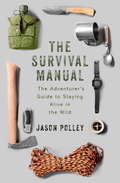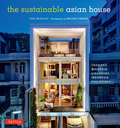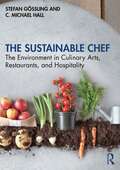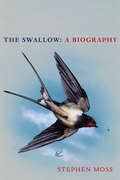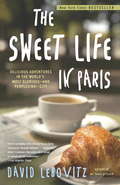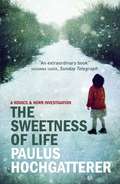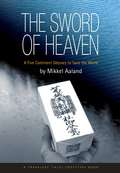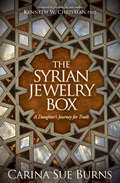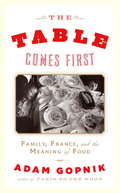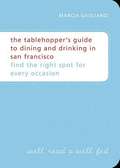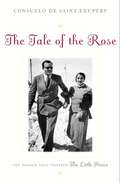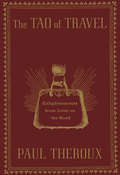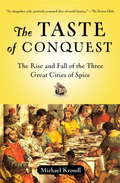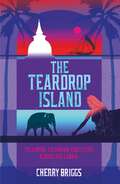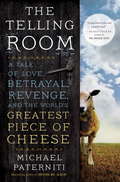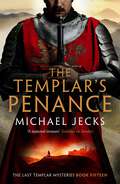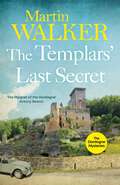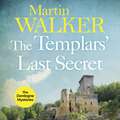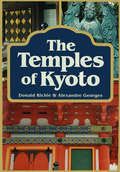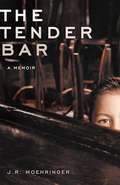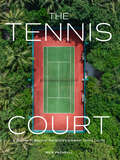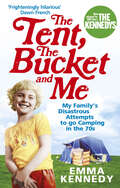- Table View
- List View
The Survival Manual: The adventurers guide to staying alive in the wild
by Jason PolleyEvery year, more than 40,000 people climb Mount Kilimanjaro. Millions head for the greatoutdoors every weekend, and the concept of the Great Outdoors has never been morepopular. If you are one of them, would you know what to do if you got stranded or hurt?"How to Survive Outdoors" gives essential, practical advice for situationsthat aren't in any way implausible. It starts with ten life-saving tips, then outlinesthe crucial components - water, food, shelter and so on. It covers scenarios any one of uscould encounter, including plane crashes and sinkings.
The Sustainable Asian House
by Masano Kawana Paul McgillickToday's byword is sustainability, and in few arenas is that more evident than in architecture. The Sustainable Asian House celebrates the new architectural vocabulary of environmental, social, and cultural sustainability as it is now emerging in Southeast Asia, specifically Thailand, Malaysia, Singapore, Indonesia, and the Philippines.The houses in this book are an exciting representation of the region's reinterpretation of tropical architecture and its growing interest in traditional materials and craftsmanship. There is a new emphasis on fresh air, natural light, and spatial variety. Designers are considering issues such as orientation to the sun and prevailing winds to reduce energy consumption and carbon footprint. The twenty-seven houses are featured in this fascinating and stunningly photographed study.
The Sustainable Chef: The Environment in Culinary Arts, Restaurants, and Hospitality
by C. Michael Hall Stefan GösslingThis book provides the first systematic and accessible text for students of hospitality and the culinary arts that directly addresses how more sustainable restaurants and commercial food services can be achieved. Food systems receive growing attention because they link various sustainability dimensions. Restaurants are at the heart of these developments, and their decisions to purchase regional foods, or to prepare menus that are healthier and less environmentally problematic, have great influence on food production processes. This book is systematically designed around understanding the inputs and outputs of the commercial kitchen as well as what happens in the restaurant from the perspective of operators, staff and the consumer. The book considers different management approaches and further looks at the role of restaurants, chefs and staff in the wider community and the positive contributions that commercial kitchens can make to promoting sustainable food ways. Case studies from all over the world illustrate the tools and techniques helping to meet environmental and economic bottom lines. This will be essential reading for all students of hospitality and the culinary arts.
The Swallow: A Biography (Shortlisted for the Richard Jefferies Society and White Horse Bookshop Literary Award) (The Bird Biography Series #3)
by Stephen MossFrom the bestselling author of The Robin, The Wren and The Twelve Birds of Christmas. With around 700,000 breeding pairs, the swallow is one of the most familiar birds in Britain. Though we consider the swallow to be 'our' bird, we also share this beloved creature with millions of others across the globe. Whilst we see it on a daily basis for half the year, the swallow then flies south to Africa, living on only in our memory in the long, dark winter.In The Swallow Stephen Moss documents a year of observing the swallow close to home and in the field to shed light on the secret life of this extraordinary bird. We trace the swallow's life cycle and journey, including the epic 12,000-mile round trip it takes every year, to enable it to enjoy a life of almost eternal sunshine, and the key part the swallow plays in our traditional and popular culture.With beautiful illustrations throughout, this captivating year-in-the-life biography reveals the hidden secrets of this charismatic and beautiful bird.PRAISE FOR STEPHEN MOSS: 'A superb naturalist and writer' Chris Packham'Inspired, friendly and blessed with apparently limitless knowledge' Peter Marren'Moss has carved out an enviable niche as a chronicler of the natural world' Daily Mail
The Sweet Life in Paris: Delicious Adventures in the World's Most Glorious - and Perplexing - City
by David LebovitzLike so many others, David Lebovitz dreamed about living in Paris ever since he first visited the city in the 1980s. Finally, after a nearly two-decade career as a pastry chef and cookbook author, he moved to Paris to start a new life. Having crammed all his worldly belongings into three suitcases, he arrived, hopes high, at his new apartment in the lively Bastille neighborhood. But he soon discovered it's a different world en France. From learning the ironclad rules of social conduct to the mysteries of men's footwear, from shopkeepers who work so hard not to sell you anything to the etiquette of working the right way around the cheese plate, here is David's story of how he came to fall in love with--and even understand--this glorious, yet sometimes maddening, city. When did he realize he had morphed into un vrai parisien? It might have been when he found himself considering a purchase of men's dress socks with cartoon characters on them. Or perhaps the time he went to a bank with 135 euros in hand to make a 134-euro payment, was told the bank had no change that day, and thought it was completely normal. Or when he found himself dressing up to take out the garbage because he had come to accept that in Paris appearances and image mean everything. The more than fifty original recipes, for dishes both savory and sweet, such as Pork Loin with Brown Sugar-Bourbon Glaze, Braised Turkey in Beaujolais Nouveau with Prunes, Bacon and Bleu Cheese Cake, Chocolate-Coconut Marshmallows, Chocolate Spice Bread, Lemon-Glazed Madeleines, and Mocha-Creme Fraiche Cake, will have readers running to the kitchen once they stop laughing. The Sweet Life in Paris is a deliciously funny, offbeat, and irreverent look at the city of lights, cheese, chocolate, and other confections.
The Sweetness of Life
by Paulus HochgattererIt is Christmas in the alpine town of Furth am See and a six-year-old girl is playing ludo with her grandfather. The doorbell rings, and the old man goes to answer. The next time the girl sees him, he is lying with his skull broken, his face a red pulp against the white snow. From that time on, she does not speak a single word. Raffael Horn, the psychiatrist engaged to treat the silent child, reluctantly becomes involved in solving the murder along with Detective Superintendent Ludwig Kovacs. Their parallel researches sweep through the town: a young mother who believes her new-born child is the devil; a Benedictine monk who uses his iPod to drown the voices in his head; a high-spending teenager who tortures cats. The psychological profile of this claustrophobic, winter-held town is not reassuring - which, if any, of its inhabitants was the brutal night-time slayer of the suffering girl's grandfather?
The Sweetness of Life
by Paulus HochgattererIt is Christmas in the alpine town of Furth am See and a six-year-old girl is playing ludo with her grandfather. The doorbell rings, and the old man goes to answer. The next time the girl sees him, he is lying with his skull broken, his face a red pulp against the white snow. From that time on, she does not speak a single word. Raffael Horn, the psychiatrist engaged to treat the silent child, reluctantly becomes involved in solving the murder along with Detective Superintendent Ludwig Kovacs. Their parallel researches sweep through the town: a young mother who believes her new-born child is the devil; a Benedictine monk who uses his iPod to drown the voices in his head; a high-spending teenager who tortures cats. The psychological profile of this claustrophobic, winter-held town is not reassuring - which, if any, of its inhabitants was the brutal night-time slayer of the suffering girl's grandfather?
The Sword of Heaven
by Mikkel Aaland"Any attempt at peace must be attended by a knowledge of self," discovers writer and photographer Mikkel Aaland, who grew up with a bomb shelter for a bedroom, in terror of nuclear war. At the height of the Cold War, Aaland finds himself drawn into a mysterious Shinto priest's plan to save the world. Traveling from Norway to the Philippines, Iceland to South Africa, he places pieces of a sacred Shinto sword in key power spots around the world. Along the way, he comes face to face with his deepest childhood fears of war and destruction, encounters the compelling and mysterious Shinto religion, struggles with the uncertainties of love, and learns to face life with an open heart.The Sword of Heaven tells the extraordinary true story of a journey in which all boundaries are pushed-geographical, cultural, and personal-and in which the healing of the world and the healing of one man appear to be inextricably linked.
The Syrian Jewelry Box: A Daughter's Journey for Truth
by Carina Sue BurnsAfter she discovers a shocking family secret, Carina takes a journey toward self-acceptance in this &“must-read for anyone who is adopted&” (Richard Krawczyk). A young American growing up in the Middle East, Carina Rourke enjoys a blissful innocence until, at age fifteen, she is captivated by an obsessive desire to look inside her mother&’s forbidden jewelry box. There, Carina discovers a shocking family secret. On the heels of her discovery, she and her family pursue her father&’s dream of a road trip through the Middle East and Europe. Their adventure serves as a metaphoric journey for the woman Carina becomes—a silent nomad searching for identity. When they reach Paris, Carina is entranced by the city&’s temptations. French pastries become a dangerous addiction and an accomplice in silence . . . and so does the love of a mysterious Tunisian. Many years later, as a married mother in Holland, Carina draws on her father&’s wisdom to finally confront the family secret and begin to heal herself and her family. &“Carina&’s book shows you how to become empowered by the sometimes shocking and traumatic experience of adoption.&” —Richard Krawczyk, author of Ultimate Success Blueprint
The Table Comes First: Family, France, and the Meaning of Food
by Adam GopnikNever before have we cared so much about food. It preoccupies our popular culture, our fantasies, and even our moralizing--"You still eat meat?" With our top chefs as deities and finest restaurants as places of pilgrimage, we have made food the stuff of secular seeking and transcendence, finding heaven in a mouthful. But have we come any closer to discovering the true meaning of food in our lives? With inimitable charm and learning, Adam Gopnik takes us on a beguiling journey in search of that meaning as he charts America's recent and rapid evolution from commendably aware eaters to manic, compulsive gastronomes. It is a journey that begins in eighteenth-century France--the birthplace of our modern tastes (and, by no coincidence, of the restaurant)--and carries us to the kitchens of the White House, the molecular meccas of Barcelona, and beyond. To understand why so many of us apparently live to eat, Gopnik delves into the most burning questions of our time, including: Should a Manhattanite bother to find chicken killed in the Bronx? Is a great vintage really any better than a good bottle of wine? And: Why does dessert matter so much? Throughout, he reminds us of a time-honored truth often lost amid our newfound gastronomic pieties and certitudes: What goes on the table has never mattered as much to our lives as what goes on around the table--the scene of families, friends, lovers coming together, or breaking apart; conversation across the simplest or grandest board. This, ultimately, is who we are. Following in the footsteps of Jean Anthelme Brillat-Savarin, Adam Gopnik gently satirizes the entire human comedy of the comestible as he surveys the wide world of taste that we have lately made our home. The Table Comes First is the delightful beginning of a new conversation about the way we eat now.
The Tablehopper’s Guide to Dining and Drinking in San Francisco: Find the Right Spot for Every Occasion
by Marcia GagliardiWhen it's time to take your parents out to dinner or your girlfriend on a sexy date, or when you're looking for a hot venue for a birthday blowout or brunch with friends, who do you turn to for a spot-on recommendation? Why, the tablehopper, of course! Marcia Gagliardi is San Francisco's cuisine concierge, providing restaurant recommendations and helping thousands of diners find the right place for the right occasion. With her unique blend of enthusiasm, insider knowledge, and sass, Marcia bases her recommendations on the reason you're going out, who you're dining with, and how much money you have to burn. This first-of-its-kind guidebook has more than 580 reviews of the tablehopper's top suggestions for: Girls' Night OutDates One, Two, and ThreeBromanceCheap DateGuys Lunch (Dude Food)Group Dining and BuyoutsMeet the Future In-LawsOld-School Power Lunch"Fun Client" Business DiningMeat Eater and VegetarianCoexistenceLate-Night ChowFlying SoloCocktail Quests Covering a huge range of places for all tastes, ages, and budgets, this insider's guide also includes sections on the South Bay, Wine Country, top eats in the East Bay, and one-, two-, and three-day San Francisco culinary itineraries. Only a local and no-holds-barred eater like the tablehopper can offer visitors and locals alike such a knowledgeable and comprehensive look at the Bay Area dining and drinking scene.From the Trade Paperback edition.
The Tale of the Rose
by Consuelo de Saint-ExupéryIn the spring of 1944, Antoine de Saint-Exupéry left his wife, Consuelo, to return to the war in Europe. Soon after, he disappeared while flying a reconnaissance mission over occupied France. Neither his plane nor his body was ever found. The Tale of the Rose is Consuelo's account of their extraordinary marriage. It is a love story about a pilot and his wife, a man who yearned for the stars and the spirited woman who gave him the strength to fulfill his dreams.Consuelo Suncin Sandoval de Gómez and Antoine de Saint-Exupéry met in Buenos Aires in 1930--she a seductive young widow, he a brave pioneer of early aviation, decorated for his acts of heroism in the deserts of North Africa. He was large in his passions, a fierce loner with a childlike appetite for danger. She was frail and voluble, exotic and capricious. Within hours of their first encounter, he knew he would have her as his wife.Their love affair and marriage would take them from Buenos Aires to Paris to Casablanca to New York. It would take them through periods of betrayal and infidelity, pain and intense passion, devastating abandonment and tender, poetic love. Several times in the course of their marriage they would go their separate ways, but always they would return. The Tale of the Rose is the story of a man of extravagant dreams, and of the woman who was his muse, the inspiration for the Little Prince's beloved rose--unique in all the world--whom he could not live with and could not live without.Written on Long Island in a quiet spell of reconciliation, The Little Prince was Antoine's greatest gift to the woman he never stopped loving, the only child to emerge from their union. The Tale of the Rose is Consuelo's reply--the love letter she never could write to her husband--a fable of its own, just as magical, poetic, and tragic as The Little Prince.
The Tao of Travel: Enlightenments from Lives on the Road
by Paul TherouxThe acclaimed author explores the greatest travel writing by literary adventurers from Freya Stark and James Baldwin to Nabokov and Hemmingway.Paul Theroux celebrates fifty years of wandering the globe with this meditative journey through the books that shaped him as a reader and traveler. Part philosophical guide, part miscellany, part reminiscence, The Tao of Travel enumerates &“The Contents of Some Travelers&’ Bags&” and exposes &“Writers Who Wrote about Places They Never Visited&”; tracks extreme journeys in &“Travel as an Ordeal&” and highlights some of &“Travelers&’ Favorite Places.&” Excerpts from the best of Theroux&’s own work are interspersed with selections from travelers both familiar and unexpected, including J.R.R. Tolkien, Samuel Johnson, Eudora Welty, Evelyn Waugh, Isak Dinesen, Charles Dickens, Henry David Thoreau, Pico Iyer, Mark Twain, Anton Chekhov, Bruce Chatwin, John McPhee, Peter Matthiessen, Graham Greene, Paul Bowles, and many more.
The Taste of Conquest: The Rise and Fall of the Three Great Cities of Spice
by Michael KrondlThe smell of sweet cinnamon on your morning oatmeal, the gentle heat of gingerbread, the sharp piquant bite from your everyday peppermill. The tales these spices could tell: of lavish Renaissance banquets perfumed with cloves, and flimsy sailing ships sent around the world to secure a scented prize; of cinnamon-dusted custard tarts and nutmeg-induced genocide; of pungent elixirs and the quest for the pepper groves of paradise. The Taste of Conquest offers up a riveting, globe-trotting tale of unquenchable desire, fanatical religion, raw greed, fickle fashion, and mouthwatering cuisine--in short, the very stuff of which our world is made. In this engaging, enlightening, and anecdote-filled history, Michael Krondl, a noted chef turned writer and food historian, tells the story of three legendary cities--Venice, Lisbon, and Amsterdam--and how their single-minded pursuit of spice helped to make (and remake) the Western diet and set in motion the first great wave of globalization. In the sixteenth and seventeenth centuries, the world's peoples were irrevocably brought together as a result of the spice trade. Before the great voyages of discovery, Venice controlled the business in Eastern seasonings and thereby became medieval Europe's most cosmopolitan urban center. Driven to dominate this trade, Portugal's mariners pioneered sea routes to the New World and around the Cape of Good Hope to India to unseat Venice as Europe's chief pepper dealer. Then, in the 1600s, the savvy businessmen of Amsterdam "invented" the modern corporation--the Dutch East India Company--and took over as spice merchants to the world. Sharing meals and stories with Indian pepper planters, Portuguese sailors, and Venetian foodies, Krondl takes every opportunity to explore the world of long ago and sample its many flavors. The spice trade and its cultural exchanges didn't merely lend kick to the traditional Venetian cookies called peverini, or add flavor to Portuguese sausages of every description, or even make the Indonesian rice table more popular than Chinese takeout in trendy Amsterdam. No, the taste for spice of a few wealthy Europeans led to great crusades, astonishing feats of bravery, and even wholesale slaughter. As stimulating as it is pleasurable, and filled with surprising insights, The Taste of Conquest offers a fascinating perspective on how, in search of a tastier dish, the world has been transformed.
The Teardrop Island: Following Victorian Footsteps Across Sri Lanka
by Cherry BriggsThe Teardrop Island follows in the footsteps of the eccentric Victorian James Emerson Tennent, along a route which takes Cherry to pilgrimage trails, tea estates, and rural regions inhabited by indigenous tribes, and through areas of the former warzone, delving under the surface of the contemporary culture via cricket matches and fortune tellers.
The Teardrop Island: Following Victorian Footsteps Across Sri Lanka
by Cherry BriggsThe Teardrop Island follows in the footsteps of the eccentric Victorian James Emerson Tennent, along a route which takes Cherry to pilgrimage trails, tea estates, and rural regions inhabited by indigenous tribes, and through areas of the former warzone, delving under the surface of the contemporary culture via cricket matches and fortune tellers.
The Telling Room: A Tale of Love, Betrayal, Revenge, and the World's Greatest Piece of Cheese
by Michael PaternitiIn the picturesque village of Guzmán, Spain, in a cave dug into a hillside on the edge of town, an ancient door leads to a cramped limestone chamber known as "the telling room." Containing nothing but a wooden table and two benches, this is where villagers have gathered for centuries to share their stories and secrets--usually accompanied by copious amounts of wine. It was here, in the summer of 2000, that Michael Paterniti found himself listening to a larger-than-life Spanish cheesemaker named Ambrosio Molinos de las Heras as he spun an odd and compelling tale about a piece of cheese. An unusual piece of cheese. Made from an old family recipe, Ambrosio's cheese was reputed to be among the finest in the world, and was said to hold mystical qualities. Eating it, some claimed, conjured long-lost memories. But then, Ambrosio said, things had gone horribly wrong. . . . By the time the two men exited the telling room that evening, Paterniti was hooked. Soon he was fully embroiled in village life, relocating his young family to Guzmán in order to chase the truth about this cheese and explore the fairy tale-like place where the villagers conversed with farm animals, lived by an ancient Castilian code of honor, and made their wine and food by hand, from the grapes growing on a nearby hill and the flocks of sheep floating over the Meseta. What Paterniti ultimately discovers there in the highlands of Castile is nothing like the idyllic slow-food fable he first imagined. Instead, he's sucked into the heart of an unfolding mystery, a blood feud that includes accusations of betrayal and theft, death threats, and a murder plot. As the village begins to spill its long-held secrets, Paterniti finds himself implicated in the very story he is writing. Equal parts mystery and memoir, travelogue and history, The Telling Room is an astonishing work of literary nonfiction by one of our most accomplished storytellers. A moving exploration of happiness, friendship, and betrayal, The Telling Room introduces us to Ambrosio Molinos de las Heras, an unforgettable real-life literary hero, while also holding a mirror up to the world, fully alive to the power of stories that define and sustain us.Advance praise for The Telling Room "For my money, Paterniti is one of the most expansive and joyful writers around--big-hearted and humane and funny. This book is a wild and amazing ride."--George Saunders, author of Tenth of December"Elegant, strange, funny, and insightful, The Telling Room is a marvelous tale and a joyful read, a trip into a world peopled by some of the most remarkable characters--and, yes, cheese--in memory."--Susan Orlean, author of The Orchid Thief "The list of writers I would read even if they were to write about a piece of cheese has always been short, but it includes Michael Paterniti. He has proved here that if you love something enough and pay a passionate enough attention to it, the whole world can become present in it. That's true of both the cheese and the book."--John Jeremiah Sullivan, author of Pulphead"An amazing achievement, The Telling Room is an inspired, masterly epic that expands and refigures the parameters of the storyteller's art."--Wells Tower, author of Everything Ravaged, Everything BurnedFrom the Hardcover edition.
The Templar's Penance (Last Templar Mysteries 15): An enthralling medieval adventure
by Michael JecksA pilgrimage across Europe throws up more than was bargained for... The fascinating fifteenth mystery in Michael Jecks' Knights Templar series, featuring the much-loved characters Sir Baldwin de Furnshill and Simon Puttock. Perfect for fans of George R. R. Martin and Paul Doherty. 'Brisk medieval whodunnit' - Literary ReviewIt is the summer of 1323, and Sir Baldwin de Furnshill and Bailiff Simon Puttock have been granted leave to go on pilgrimage. Together they travel across Europe to Santiago de Compostela. But danger is never far away, and when a beautiful girl is found murdered on a hillside, the friends are among the first on the scene.Baldwin and Simon lend their investigative skills to the inquiry, headed by the local pesquisidore. But the unexpected appearance of a face from Baldwin's past could threaten the investigation, as well as the future of Baldwin himself... What readers are saying about The Templar's Penance: 'Set in England and overseas, this is a great read from the master of medieval mystery. These books are really well researched and give you a taste of life in the middle ages - great read''It reads very well, the characters, the places and situations all hold one's interest''Five stars'
The Templars' Last Secret: Bruno digs deep into France's medieval past to solve a thoroughly modern murder (The Dordogne Mysteries #10)
by Martin Walker'ENCHANTING COUNTRY MYSTERIES THAT EMBODY THE SUBLIME PHYSICAL BEAUTY OF THE DORDOGNE' New York TimesIn this latest mouthwatering mystery starring French country cop, Bruno, the body of a woman is found outside a cave beneath the ruined Templar chateau of Commarque in the heart of the Dordogne. She died of a broken neck. An accidental fall, or was she pushed?The victim carries no identification and her fingerprints are not known to the French Police or Interpol.The only clue to the woman's identity is that her dentistry looks American, but Bruno's inquiries at local hotels and gites yield no trace of a missing foreign woman. The chateau of Commarque, begun in the 11th century, was founded by a Bishop of Sarlat and entrusted to the Knights Templar. In the rocks beneath it are caves. It is one of the few Templar sites in France that has never been associated with the fabled hidden treasure of the Templars - never until now, when a local journalist publishes a sensational story around the unknown woman's death and a centuries-old mystery looks like it might finally be solved...
The Templars' Last Secret: The Dordogne Mysteries 10 (The Dordogne Mysteries #10)
by Martin Walker'ENCHANTING COUNTRY MYSTERIES THAT EMBODY THE SUBLIME PHYSICAL BEAUTY OF THE DORDOGNE' New York Times In this latest mouthwatering mystery starring French country cop, Bruno, the body of a woman is found outside a cave beneath the ruined Templar chateau of Commarque in the heart of the Dordogne. She died of a broken neck. An accidental fall, or was she pushed? The victim carries no identification and her fingerprints are not known to the French Police or Interpol.The only clue to the woman's identity is that her dentistry looks American, but Bruno's inquiries at local hotels and gites yield no trace of a missing foreign woman. The chateau of Commarque, begun in the 11th century, was founded by a Bishop of Sarlat and entrusted to the Knights Templar. In the rocks beneath it are caves. It is one of the few Templar sites in France that has never been associated with the fabled hidden treasure of the Templars - never until now, when a local journalist publishes a sensational story around the unknown woman's death and a centuries-old mystery looks like it might finally be solved...(P)2017 WF Howes Ltd
The Temples of Kyoto
by Donald Richie Alexandre GeorgesThe Temples of Kyoto takes you on a journey through these environs and presents twenty-one of these marvelous structures that are unique creations which, while quintessentially Japanese, somehow speak a universal languagereadily appreciated by people the world over. Donald Richie, called by Time magazine, "the dean of art critics in Japan," turns his attention to these twenty-one temples with scholarship and an eye for the dramatic. Drawingoff such classic sources as The Tale of Genji and Essays in Idleness, he takes the reader on a tour through the ages, first with a comprehensive history of Japanese Buddhism, and then by highlighting key events in the development of these "celestial-seeming cities." From the Tendai warrior-priests of Enryaku-ji to the floating vision of paradise at Byodo-in, to the magical gardens of Tofuku-ji, the past springs into the present and the temples truly take on a life of their own in a thrilling narrative that weaves fact and legend into a guide as entertaining as it is informative. Brilliant photographs of the temples, taken by the award-winning photographer Alexandre Georges, complement the text and provide a visual overview of the subject matter. His keen eye captures on film the elements that make each temple noteworthy, including their interiors, and objets d'art, in a fresh and thought provoking manner. The result is this book: a testament and meditation on the power and elegance of these world-renowned structures that are both places of worship and examples of the finest art Japan has ever produced.
The Temples of Kyoto
by Donald Richie Alexandre GeorgesThe Temples of Kyoto takes you on a journey through these environs and presents twenty-one of these marvelous structures that are unique creations which, while quintessentially Japanese, somehow speak a universal languagereadily appreciated by people the world over. Donald Richie, called by Time magazine, "the dean of art critics in Japan," turns his attention to these twenty-one temples with scholarship and an eye for the dramatic. Drawingoff such classic sources as The Tale of Genji and Essays in Idleness, he takes the reader on a tour through the ages, first with a comprehensive history of Japanese Buddhism, and then by highlighting key events in the development of these "celestial-seeming cities." From the Tendai warrior-priests of Enryaku-ji to the floating vision of paradise at Byodo-in, to the magical gardens of Tofuku-ji, the past springs into the present and the temples truly take on a life of their own in a thrilling narrative that weaves fact and legend into a guide as entertaining as it is informative. Brilliant photographs of the temples, taken by the award-winning photographer Alexandre Georges, complement the text and provide a visual overview of the subject matter. His keen eye captures on film the elements that make each temple noteworthy, including their interiors, and objets d'art, in a fresh and thought provoking manner. The result is this book: a testament and meditation on the power and elegance of these world-renowned structures that are both places of worship and examples of the finest art Japan has ever produced.
The Tender Bar: A Memoir
by J. R. MoehringerAutobiography of a news reporter abandoned by his father, a New York City disc jockey who vanished before J. R. spoke his first word.
The Tennis Court: A Journey to Discover the World's Greatest Tennis Courts
by Nick PachelliA fresh approach to a beloved sport, The Tennis Court is a photographic journey of the 200 most breathtaking tennis courts around the world. &“Nick Pachelli takes us on court in every corner of the world with a sharp eye for what makes our game and the people who champion it so special.&” —Billie Jean King, sports icon and equality advocate Every one of the world&’s half a million tennis courts is, at its most basic, an identical blank canvas: a 78-foot by 36-foot rectangle, divided by a 3-foot-high net in its center, and marked with eleven straight lines. But add in the elements of surface, space, wind, acoustics, crowds, shadows, humidity, and even air density, and every tennis court is unique—a work of art. And some are masterpieces. Nick Pachelli curates and profiles 200 of the world&’s most beautiful, iconic, significant, alluring, and idiosyncratic tennis courts from across the globe, each breathtakingly photographed. He explores the heavyweights, including Wimbledon&’s All England Lawn Tennis Club, which employs a hawk to keep stray birds from soiling the meticulous lawns. Arthur Ashe, the Grandstand, and Court 17 in Flushing, Queens, where hundreds of thousands of tennis fans gather every summer for the US Open. And there&’s Court Philippe-Chatrier at Roland-Garros, whose clay seems to take on a different shade—burnt orange, burnt red, burgundy, umber—every time you see it. We visit far-flung treasures, such as Waiheke Tennis Club in New Zealand, where you&’ll need to take a plane, then a ferry, then a car or bus, and then walk before arriving there. Indoor marvels, including the Tennis Club de Belgique, which evokes the hushed, reverent feeling of a theater, with skylights illuminating the court and leaving the spectators in the shadows. Hidden jewels, such as the tiny Tennis Club San Stin in Venice, a secret, single outdoor clay court tucked away behind a villa and a 15-foot wall shrouded with vines. There are urban courts, including the Knickerbocker Field Club, deep in the heart of Flatbush, Brooklyn. Academies, like Rafael Nadal&’s tennis temple in Mallorca, Spain. And the extreme: a single court completely isolated in the wilds of Scotland; a court in northern Spain revealed when the tide goes out, the sand hardens, and the metallic plates that serve as lines reemerge; and a court in Kenya made out of termite mounds. Throughout, Pachelli not only conducts a masterful, once-in-a-lifetime tour of the world&’s best courts, but in his writing does something equally immersive: He captures the real passion—some might say obsession—that tennis inspires. Because it&’s on the court, no matter how grandiose or mundane, whether in an exotic locale or around the corner, where tennis players truly see themselves. Where we come face-to-face with our temperament, our drive, our frustration, our bliss, our longing.
The Tent, the Bucket and Me
by Emma KennedyEmma Kennedy's hilarious memoir of wet and windy family trips, NOW ADAPTED FOR THE MAJOR BBC ONE SERIES THE KENNEDYS. For the 70s child, summer holidays didn't mean the joy of CentreParcs or the sophistication of a Tuscan villa. They meant being crammed into a car with Grandma and heading to the coast. With just a tent for a home and a bucket for the necessities, we would set off on new adventures each year stoically resolving to enjoy ourselves. For Emma Kennedy, and her mum and dad, disaster always came along for the ride no matter where they went. Whether it was being swept away by a force ten gale on the Welsh coast or suffering copious amounts of food poisoning on a brave trip to the south of France, family holidays always left them battered and bruised.But they never gave up. Emma's memoir, The Tent, The Bucket and Me, is a painfully funny reminder of just what it was like to spend your summer holidays cold, damp but with sand between your toes.
